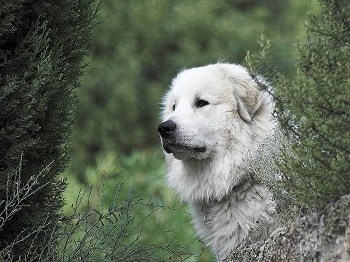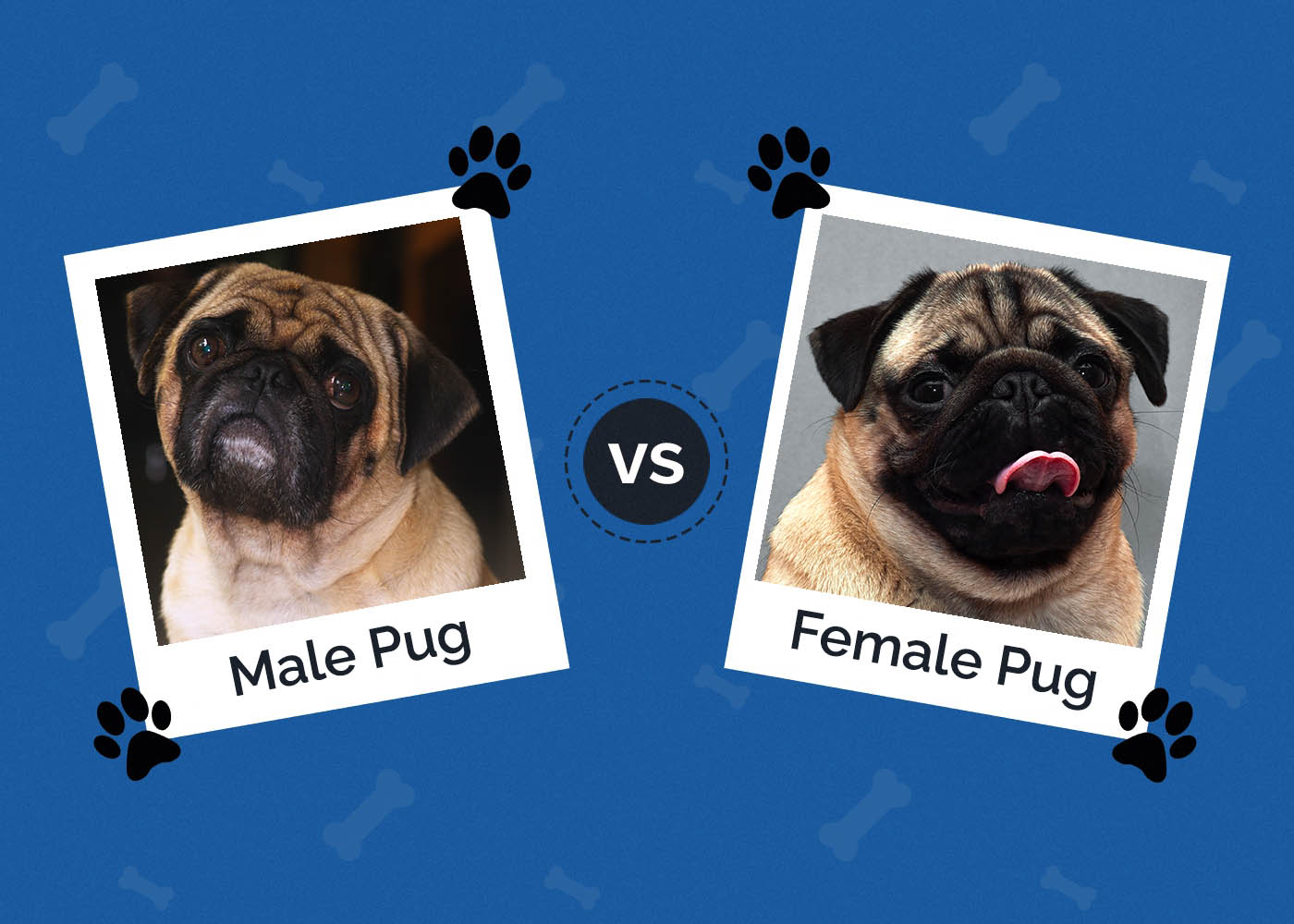Shiba Inu vs. Corgi: Which Breed Is Right for You?

Updated on
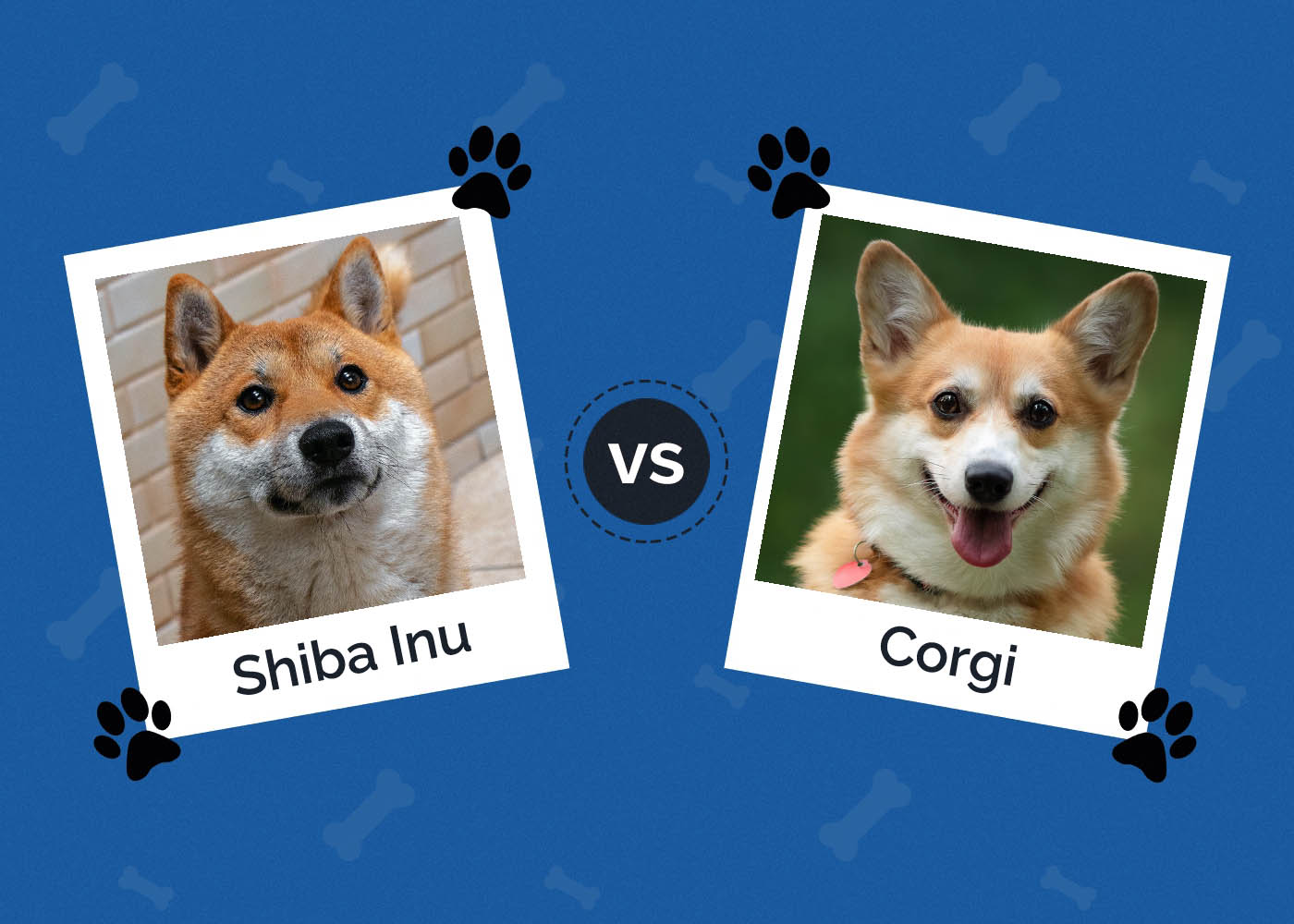
Ah, the age-old question of the Shiba Inu versus the Corgi. If you take these two breeds at face value, you may assume they are similar due to their appearance. The truth, however, is these two small canines are as different as night and day. Each one has their own personality traits and quarks. Although both are cute, squat, and furry, you will want to take a look at the information below if you are trying to decide which one is right for you.
In the article below, we will not only give you an overview of these two purebred companions, but we will also break down the major differences between them and outline which pup is better suited for which household.
If you are plagued by the riddle of which is right for you, the Shiba Inu or the Corgi, keep scrolling!
Shiba Inu vs. Corgi: Visual Differences
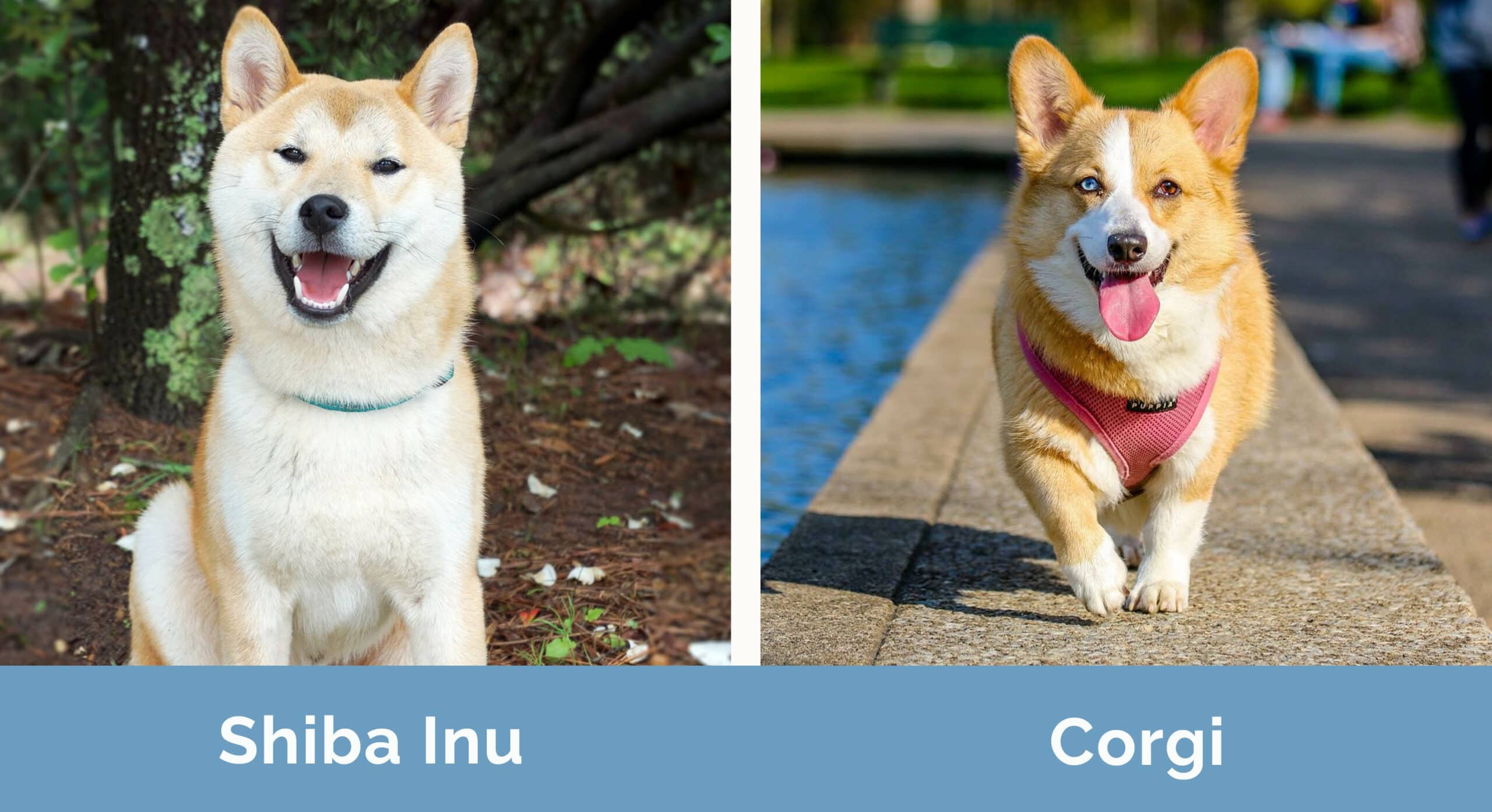
A Quick Overview
- Average Height (adult): 13-17 inches
- Average Weight (adult): 17-23 pounds
- Lifespan: 12-16 years
- Exercise: 30+ min/day
- Grooming needs: Weekly
- Family-friendly: Often
- Dog-friendly: Often
- Trainability: Difficult
- Average Height (adult): 10-12 inches
- Average Weight (adult): Up to 30 pounds
- Lifespan: 12-14 years
- Exercise: 1+ hours/day
- Grooming needs: Low
- Family-friendly: Yes
- Dog-friendly: Often
- Trainability: Excellent
At a Glance
Shiba Inu
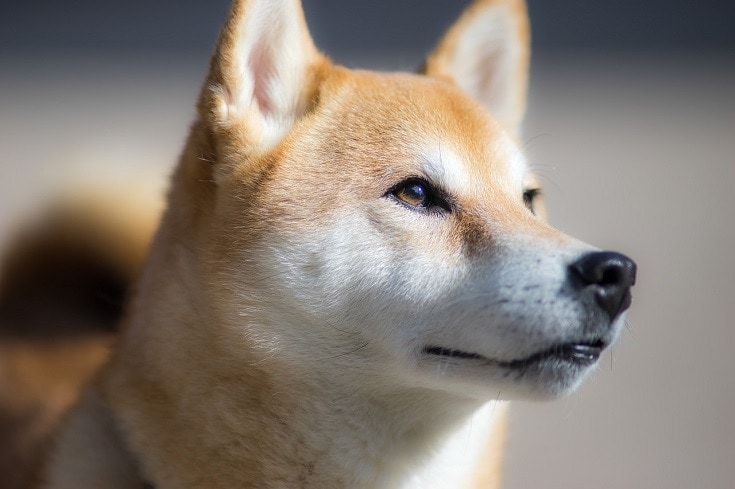
- Intelligent
- Doesn’t need constant exercise
- Fairly healthy
- Soft fur
- Not a barker
- Calm
- Not good with kids or other pets
- Separation anxiety
- Harder to train
- Stand-offish
- Sheds
Corgi
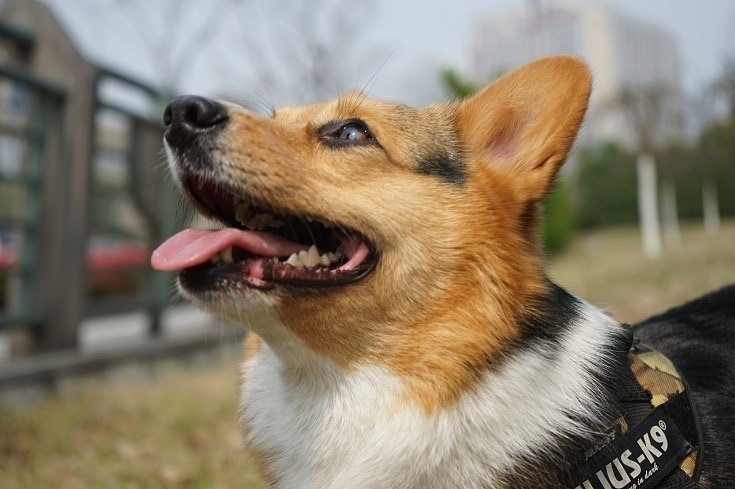
- Friendly
- Good with kids and other pets
- Good watchdog
- Social
- Adaptable
- Easier to train
- More health concerns
- Stubborn
- Can bark non-stop
- Can nip
- Can be hyper
Shiba Inu Overview
The Shiba Inu is a small and compact dog that originated in Japan. They are intelligent, calm, and independent. On average, they stand between 14.5 and 16.5 inches tall, and they weigh about 23 pounds. This purebred dog has a life expectancy of between 12 to 15 years, as well.

This hardy pup was originally bred to hunt large game, and they maintain their prey drive along with their serious attitude. That being said, there are many facets of the Shiba Inu’s personality, care, health, and training you should be aware of before deciding on whether this breed is right for you.
Personality
The Shiba Inu is a breed that is best handled by an experienced owner. While they are loyal and loving dogs, they may not always show it. In fact, they often show their standoffish side instead. On the other hand, they are very intelligent and calm, and they don’t bark often.
The Shiba Inu is also not the best pet for homes with small children or other pets. They have a low tolerance for being bothered or roughhoused. They have no problem giving a child a quick nip if they are being annoyed. That, coupled with their possessiveness, makes small kids not the best idea.
Their prey drive will also have this husky pooch chasing smaller animals. They will do this with other pets in the home or small animals outside. Beyond that, these dogs make a great companion for a single person. They are loyal, can be affectionate, and they become very attached to their owners.
Unfortunately, their attachment can cause them to have separation anxiety. If left alone for too long, they can become destructive, howl, and engage in other bad behaviors. Plenty of exercise, toys, and attention usually cures this, however.
Care ✂️
The Shiba Inu has a double coat of soft fur that sheds quite a bit. They will need to be brushed often especially during the shedding season. This is when they have what is called “a blown coat.” This can be difficult for people with pet dander allergies as a “blown coat” looks like a pillow exploded on your furniture. The more you groom this breeds fur, however, the easier it will be.
Beyond that, the care is more or less basic. They will need their teeth brushed as often as possible, their ears checked and wiped clean weekly, and their nails clipped as needed.
Next to grooming care, this breed also requires exercise. They have low to moderate activity levels, so you may need to persuade them to get outside and play. Weight gain is a real possibility, but a 10- to 15-minute walk per day makes a big difference.
You will also want to give your pooch some mental stimulation in the way of toys and games. If they are up for learning tricks, even better, but this breed is not known for playing the clown. Attention, time, and love from their owner is essential for this breed’s overall health, and it will reduce their separation anxiety.
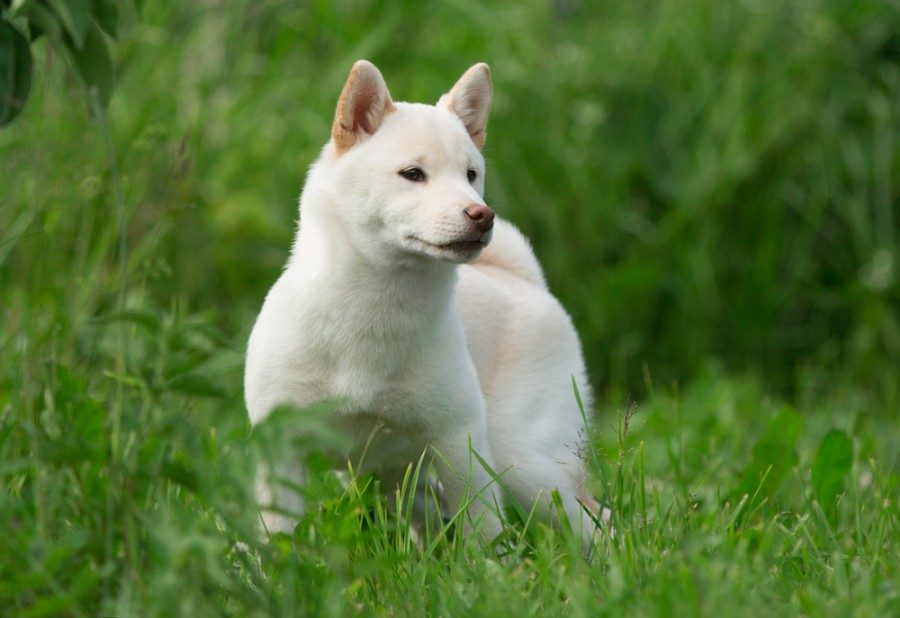
Training
Training this independent-thinking and stubborn canine is not always the easiest road to go down. It will require a lot of patience, repetition, and persistence. Shiba Inu’s like to be in charge, so they will try to act like the boss. Not surprisingly, they require a strong alpha leader to be happy.
You also want to employ positive reinforcement while training. Any harsh treatment will make them even more stubborn and more likely to be aggressive. Calm tones, treats, and short yet product training sessions are the best way to go. Be prepared for it to take some time, however.
All types of training are important for this breed, but early socialization is extremely important. Introducing your pup to other dogs and animals will help them be less possessive and domineering as they get older.
Health
Like most pure breed canines, the Shiba Inu is prone to some health concerns. Not every individual dog will develop these, but they are still a possibility. Take a look at the health concerns listed below.
- Hip and elbow dysplasia
- Cataracts
- Allergies
- Heart disease
- Hypothyroidism
As mentioned, this breed is prone to weight gain, so proper exercise and nutrition will go a long way in keeping them healthy. You also need to get them regular check-ups with your vet to keep an eye on any other ailments that might develop.
Corgi Overview
The Corgi is another small, pure breed dog that originated in Wales. They were originally bred to herd cattle, so they maintain their seriousness when it comes to doing a job. This little guy has an average life expectancy of 11 to 13 years. They also range from 10 to 12 inches in height and can weigh between 24 and 27 pounds. They are friendly, great family dogs, and gentle. Like the Shiba Inu above, however, there are many different facets to their personality and care that we will go over below.
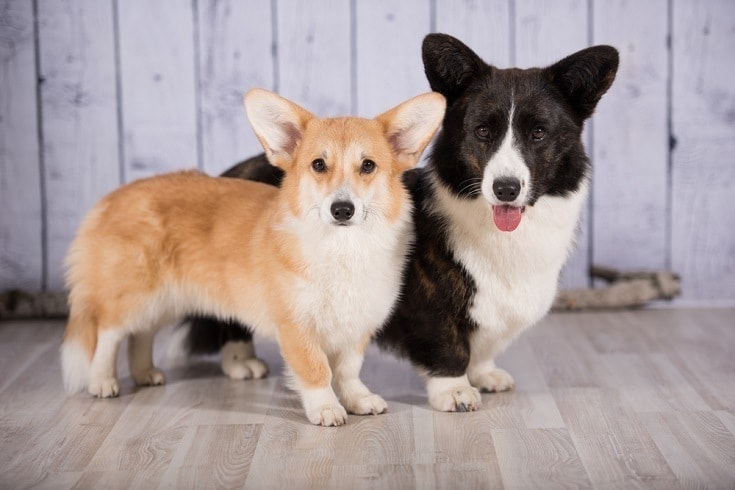
Personality
The Corgi is a friendly, gentle, playful pup that also makes a great watchdog. They are great with children, though they can tend to herd them around. They are also good with other animals and pets. Unlike the Shiba Inu, the Corgi will get along with dogs and cats in the household.
This small pup is social and active. They have a fair amount of energy and can be hyper in some cases. They are also prone to barking, so early training is essential. The interesting part about this canine, however, is their ability to be serene and calm, as well as active and rambunctious. They can, quite literally, show both traits at the same time.
You will find this pooch to be affectionate and intelligent. That being said, they can also have a stubborn streak. Their herding background leads them to act like the boss, too. They will require a strong leader to set an example of good behavior.
Care ✂️
The care requirements for this purebred are easier than our furry friend above. They have a dense and rough coat that doesn’t shed a lot. Still, they will require brushing with a pin brush at least once a week. They can be bathed as needed.
Similar to the Shiba, the Corgi should have their teeth cleaned as often as possible. Every day is ideal, as this little guy can be prone to dental issues. Beyond that, their ears should be checked weekly for signs of mites and infection, while their nails should be trimmed on an as-needed basis.
When it comes to physical exercise needs, the Corgi has higher requirements. They are a moderate energy level pet that need daily walks with some extracurricular activities as well. Mental stimulation in the form of games, fetch, and other amusements are imperative to keep this pet happy.
Keep in mind, when this breed becomes bored, they can be destructive. They can also bark non-stop. Although they don’t suffer from separation anxiety as much as their above counterpart, they need a good amount of attention and love from their family.
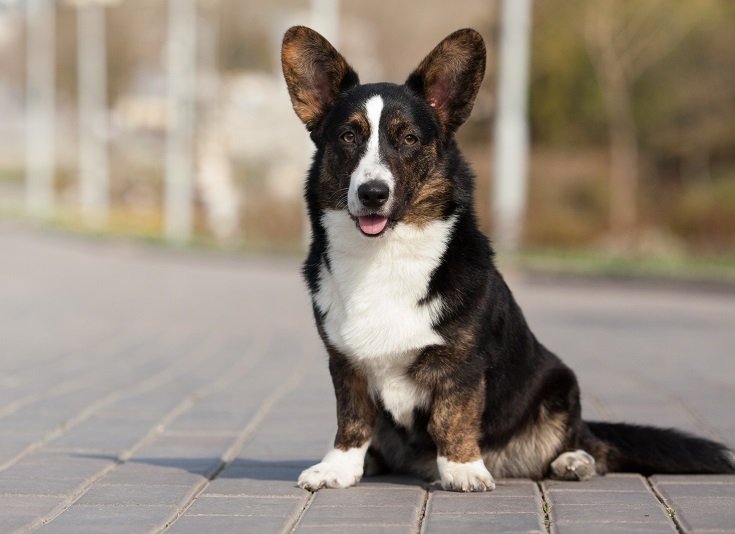
Training
Training the Corgi is a bit easier as well. Keep in mind that they will try to be in charge and any harsh treatment will cause them to become very stubborn. They can also nip if they feel in danger or mistreated.
As with most animals, early socialization is important but not as imperative as with the Shiba. This dog will also benefit from positive reinforcement along with short and fun training sessions. Housebreaking, obedience, and behavioral training should be started right away.
Something else to note about this breed is their adaptability. They can easily learn new rules and become comfortable in new places. Again, it’s important to have the basic training down pat and encourage them with positive reinforcement.
Health
Unfortunately, the Corgi breed has a better chance of developing health concerns. Like all pets, it’s important to take them to the vet annually for a check-up. You want to check their dental hygiene, plus have the vet look at their diet to ensure they are not gaining too much weight.
Besides those issues, here are some other health concerns this breed is prone to developing:
- Intervertebral disc disease
- Hip dysplasia
- Epilepsy
- Degenerative myelopathy
- Lens luxation
- Von Willebrand’s disease
- Progressive retinal atrophy
- Urinary stones
Shiba Inu and Corgi Dog Differences
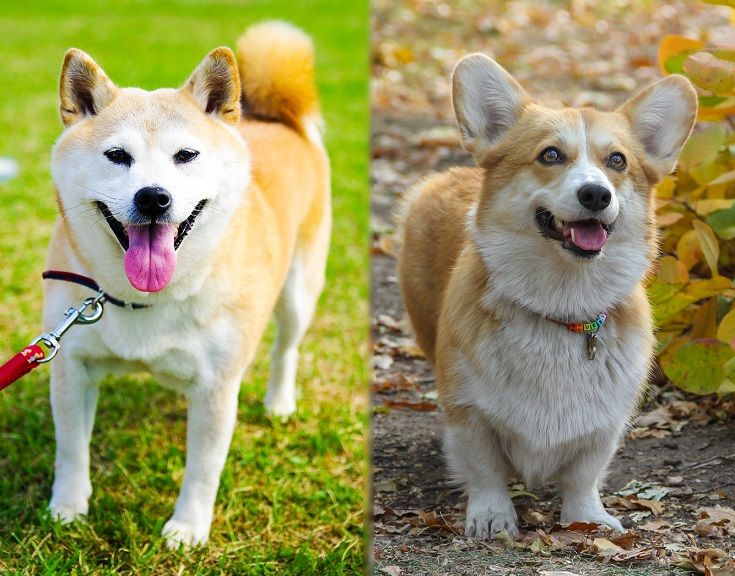
Now that you have some knowledge of each breed, we want to take a look at the main differences between these two canines. While both of them can make great pets, it is for very different people and households. Take a look at the most marked differences in their care and personalities.
Their Personality Differences
The Shiba Inu and Corgi share a few traits. They can both be stubborn and independent, and they are both intelligent canines. The most marked difference, however, is the Corgi tends to be a lot friendlier than the Shiba Inu. While the Shiba is not a pup we would recommend for homes with other pets and small children, the Corgi thrives in this type of environment.
Another marked difference is the attention each dog needs. For example, the Shiba can have serious separation anxiety that can be difficult to deal with if you are away from home for extended periods. The Corgi, on the other hand, is okay to be left alone as long as they are well provided for. Keep in mind, the Corgi can also become destructive if left to their own devices for too long, plus they are more apt to bark incessantly.
Another area where these pooches differ is in their affection level. Though the Shiba is devoted to their family, they don’t always show it. The Corgi is more likely to snuggle and show outward signs of love.
Their Care ✂️
The care of these two animals is also different. The Shiba requires a lot more grooming than the Corgi. Their coat needs to be maintained almost daily due to shedding while the other requires little maintenance. You also need to keep a closer eye on the Corgi’s teeth for signs of bacteria and tartar build-up. Additionally, the Corgi is more prone to health concerns and hereditary diseases.
When it comes to outdoor activity, the Corgi wins the round. They are a lot more active than the Shiba and require daily outings. On the opposite end, you may have to persuade your Shiba Inu to play outside as they can often prefer to be lazy.
Finally, both of these animals will require a fair deal of patience when it comes to training. Both also need a strong alpha leader. As each canine has a stubborn streak and wants to be the boss, it will take repetition and time. That being said, the Shiba Inu wins this round. They are more likely to challenge authority, and they can be very assertive.
Which One Is Right for You?
So, which of these animals is right for you? In our opinion, the Corgi is an ideal companion for an active family. They are great with children, make good guard dogs, and their playful antics make them fun and affectionate. On the other hand, single people, or those with older children, will do well with a Shiba Inu.
If you work from home but are not interested in a pup that needs to sit on your lap all day, the Shiba Inu may be the right breed for you to adopt. Keep in mind, we recommend people with other pets, and those with allergies to pet dander, to be cautious. Either way, it is always a good idea to look into the breed of your choice first before you decide to take one home.
Conclusion
It is always important to understand that each dog is an individual and will have their own personality traits. Not every Corgi barks all the time while not all Shiba Inu’s are standoffish. Regardless, both of these purebred dogs have their pros and cons. We hope this article has given you some perspective on each breed and that it has helped you make a decision on which one is right for you!
See Also:
- Finnish Spitz vs. Shiba Inu: The Key Differences (With Pictures)
- Shikoku vs Shiba Inu: Key Differences (With Pictures)
Featured Image Credit: (L) Gabriel Yuji, Unsplash | (R) Viola Ater, Shutterstock






